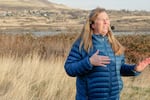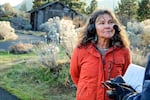
The Gorge Towns to Trails initiative aims to connect communities on both sides of the Columbia River, shown here on Thursday, Dec. 15, 2022, via a 200-mile loop trail.
Sheraz Sadiq / OPB
The Columbia River Gorge National Scenic Area is the largest scenic area in the U.S., covering more than 80 miles of forest, hills and bluffs in Oregon and Southwest Washington.
Its original management plan included the ambitious goal of creating a network of trails to wrap around the entire gorge. Forty years later, that vision is moving closer to reality with the construction of a 200-mile trail network linking towns in Oregon and Washington on both sides of the Columbia River.

Gorge Towns to Trails project manager Renée Tkach speaks with "Think Out Loud" host Dave Miller on the Riverfront Trail in The Dalles on Thursday, Dec. 15, 2022. Tkach hopes to see trail connections between Hood River and The Dalles, Washougal and Stevenson and Underwood and Lyle in the next 50 years.
Sheraz Sadiq / OPB
“We’ve had over 40,000 acres go from private to public lands, especially in this region between Hood River and the Dalles,” said Renée Tkach, the Gorge Towns to Trails project manager with Friends of the Columbia Gorge. “It created this opportunity to look at, ‘Could we connect towns to towns?’ And the reality was that yes, we could.”
Conservation nonprofit Friends of the Columbia Gorge was instrumental in securing the National Scenic Area designation and has since worked to protect the scenic resources that draw roughly two million visitors to the gorge each year.
The organization is also spearheading the Gorge Towns to Trails initiative, which Tkach hopes will one day offer a multi-day hiking opportunity for recreators in the area.
Since towns in the gorge are placed roughly 15 to 20 miles apart, she said, the trail would lend itself to gentler trekking trips, as opposed to more rugged backpacking.
“Around the world you have these trekking opportunities that go from town to town, and we really don’t have anything like that in the United States,” Tkach said. “You’re actually hiking from town to town, sleeping in a lodging facility, eating the local foods, experiencing the local culture, sipping the local beverages.”
Friends of the Columbia Gorge has secured 80% of the land needed to complete the project and has so far completed 45% of the total trail miles.

A map of the proposed 200-mile Towns to Trails project.
Courtesy Friends of the Columbia Gorge
Tkach said the project has encountered some concerns from local communities concerned about the impact hiking, backpacking and other recreational activities are having on the gorge.
She said the main goal of Towns to Trails isn’t necessarily to attract new visitors, but to allow visitors who do come to interact with the land in a way that protects its sensitive plant species and wildlife habitats.
“It’s going to create a managed trail system that will be planned and avoid impact to those cultural, scenic and natural resources,” Tkach said.
Cultural resources, she said, are also at risk when trails aren’t managed, such as first foods that are important to the Native tribes who have lived in the region for millennia. The project is beginning to work with tribal members to incorporate culturally appropriate signage throughout the trail.
D’na Chase is a land trustee with Friends of the Columbia Gorge. Though a citizen of the Cherokee Nation, she’s lived in the gorge for most of her life and serves as a kind of unofficial tribal liaison for the project.

D'na Chase speaks with "Think Out Loud" host Dave Miller on the Riverfront Trail in The Dalles on Thursday, Dec. 15, 2022. A land trustee with Friends of the Columbia Gorge, Chase serves as a kind of unofficial tribal liaison for the Gorge Towns to Trails project, helping to engage the area's Native tribes in its construction.
Sheraz Sadiq / OPB
“My hopes would be that we ... get Native tribes involved at the beginning of this so that they’re actually the leaders,” she said. “We should be listening to what they have to say. They have the original instructions on how to live with this land.”
Chase said she hopes to see contemporary culture included in trail signage that celebrates all of the gorge’s Indigenous communities, instead of labeling it as generic “Native American” history.
“We need to tell more of the story, I think,” Chase said. “There’s more history and culture than just the history of settlement.”
She said she’d also like to see tribal members leading hikes and conducting public ceremonies on the trail so that visitors can “explore nature and learn it from their perspective.”
Work on the Towns to Trails loop appears to be steady but slow, involving commitments from multiple stakeholders, land easement agreements, environmental impact assessments and other efforts to avoid disrupting sensitive habitat and species.
But Tkach pointed to one completed connection, from Mosier to The Dalles, as an example of the benefits the project can have by linking communities via trail.
“Mosier was a town that couldn’t keep a coffee shop open year-round,” she said. “Since the Mosier Plateau trail was established there, now they have a coffee shop, they have a restaurant, they have food carts — they have a town that is becoming vibrant off of the recreation visitation.”
Tkach said she hopes to see trail connections from Hood River to The Dalles, Washougal to Stevenson and Underwood to Lyle in the next 50 years.
“Between those, the private land segments are pretty much prohibitive unless we get into creative solutions,” she said. “And those always arise — I’m constantly surprised at when I think something is an absolute ‘no,’ and then a door opens and an opportunity arises for a connection.”
Renée Tkach and D’na Chase spoke to “Think Out Loud” host Dave Miller. Click play to listen to the full conversation:
